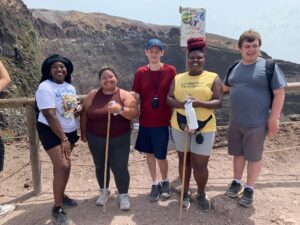Wonderful question. We made a few curricular tweaks. Our hallmark assignment, the scavenger hunt, usually consists of a list of places and objects to find in Rome, with students taking a picture of themselves at the various locations with the items. In the past we did the assignment with the intention of being graded and it being competitive. This time we decided to grade the assignment but without prizes and added one element: to go to places and be reflective. That is, the students were encouraged to go to a place that moved them, and asked them, for instance, about food they tried and would not try again. We thoroughly enjoyed their reflective pieces.
In what ways did you see students impacted?
I think they will keep returning to their experience as the months unfold. What we observed on the trip was an increased independence on the part of the students. They were responsible for their own meals and getting to sights on their own. Technology has given us additional tools for mapping public transportation. We saw them grow in leaps and bounds.
We also added three discussion sessions. In them we discussed our intercultural awareness. In those discussions we see how they grappled with being in a foreign country and how this reflected on who they are. For example, not being able to speak Italian fluently made them more sympathetic to non-English language speakers.
This year we also had the most number of students of color. Several had distressing experiences in Italy. We worked on giving them time and space to discuss their experience and to figure out ways of being supportive. The trip raised for them questions about who they are as Americans of color in a foreign country.
What was the strangest thing you experienced on this trip?
My faculty co-director had a medical emergency. We had to do some quick problem solving and decision making, and we made some mistakes. We took our colleague to the wrong hospital and had to do all of the transportation ourselves in taxis. It felt harrowing and we were so worried as she was in so much pain.
This was hard. But we also visited new sites that we hadn’t been to and felt more confident on that front, including being at a site and speaking extemporaneously.
So good stuff and not so good stuff.
It sounds like you had to improvise and that you and your students grew off of these experiences?
I can’t tell you how helpful it was to draw on a playful and philosophical mindset in some of these very serious situations. We had to think on our feet and frame things for students in a way that showed that what we were going through–the hard things as well as the joyful and wonderful things–was part of the intercultural experience. For me, and I think for all of us, improv was key.
For information on UNCG Study Abroad in Rome, click here.
